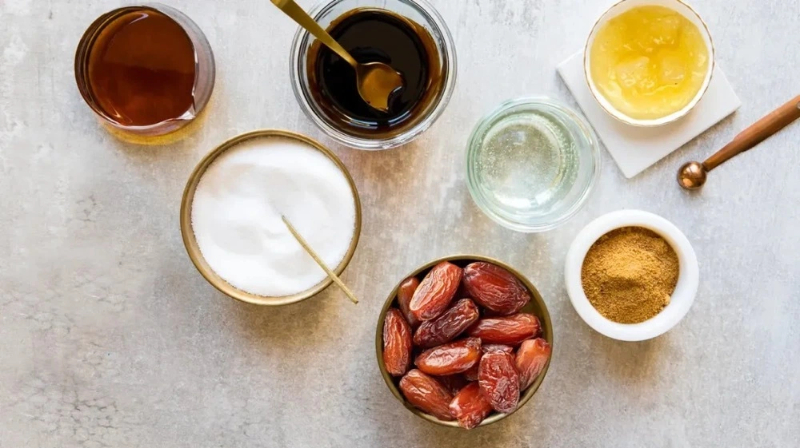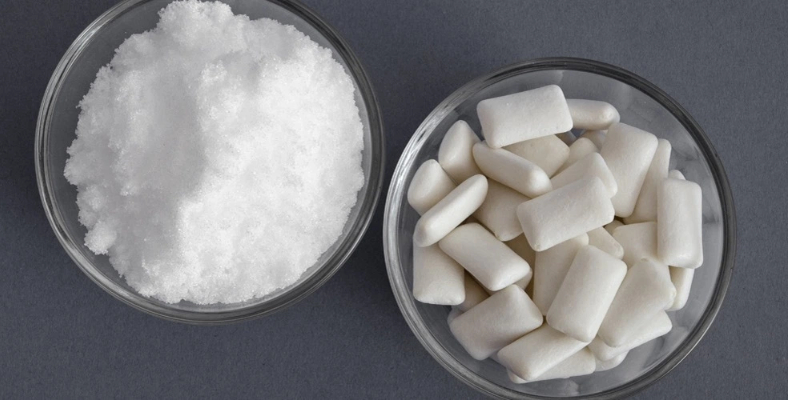Views: 222 Author: Sara Publish Time: 2025-10-22 Origin: Site








Content Menu
● What Are Artificial Sweeteners?
● Popular Artificial and Natural Sweeteners
>> Stevia
>> Erythritol
>> Sucralose
>> Aspartame and Other Synthetic Sweeteners
● Emerging Health Risks and Research
● Comparative Overview of Sweeteners
● FAQ
>> 1. What is the safest artificial sweetener for daily use?
>> 2. Can artificial sweeteners cause cognitive decline?
>> 3. Are sugar alcohols like erythritol safe?
>> 4. Can artificial sweeteners increase appetite?
>> 5. Do artificial sweeteners affect hormonal development?
Artificial sweeteners have become an integral part of modern diets, offering sweetness without the calories of sugar. With increasing attention on health and wellness, many consumers and manufacturers seek the healthiest sweetener options for foods, beverages, and healthcare products. This article explores various artificial and natural sweeteners in depth, providing scientific insights to help choose the healthiest sweetener in 2025.

Artificial sweeteners are substances added to foods and drinks to provide sweetness without the calories of sugar. They can be either synthetic or derived from natural sources and vary significantly in sweetness potency, calorie content, metabolic impact, and health effects. The goal is to substitute sugar with sweeteners that reduce calorie intake, assist weight management, and support metabolic health while minimizing potential risks.
Stevia is a natural sweetener extracted from the leaves of the *Stevia rebaudiana* plant. It is approximately 250 times sweeter than sugar but contains no calories. Beyond sweetness, stevia has been studied for its potential health benefits, including lowering blood pressure and blood glucose levels. Many manufacturers favor stevia for its natural origin and safety profile. However, its slightly bitter aftertaste can be a limitation, often mitigated by blending with other sweeteners.[10][11]
Monk fruit sweetener, derived from the Luo Han Guo fruit, is another natural, zero-calorie sweetener. It is 150 to 300 times sweeter than sugar and contains antioxidants that may confer anti-inflammatory benefits. Monk fruit is commonly used in combination with other sweeteners to balance taste and stability in food products.[12][10]
Erythritol is a sugar alcohol that closely mimics the taste and bulk of sugar but without significant calories. It does not raise blood sugar or insulin levels, making it suitable for diabetics. Erythritol is well tolerated but high doses may cause mild digestive discomfort in some individuals. It additionally exhibits antioxidant properties.[13][12]
Sucralose is an intense synthetic sweetener approximately 600 times sweeter than sugar. It is widely used in processed foods and beverages due to its stability under heat and pH variations. Although FDA-approved and calorie-free, concerns have been raised about its long-term health effects and its potential to stimulate appetite and hunger signals in the brain, especially in individuals with obesity.[6][11]
Aspartame and acesulfame potassium are synthetic sweeteners used extensively in diet sodas and low-calorie snacks. These sweeteners have faced scrutiny over potential health risks, including links to cancer, though regulatory agencies uphold their safety within permitted intake levels. Recent studies also suggest a possible association between frequent consumption of these sweeteners and cognitive decline.[5][14][12]

New research in 2025 has uncovered several important concerns linked with artificial sweetener use:
- A large cohort study in Brazil tracked over 12,000 adults for eight years and found that high consumption of low- and no-calorie sweeteners — including aspartame, saccharin, acesulfame-K, erythritol, sorbitol, and xylitol — was associated with a 62% faster decline in cognitive abilities, equivalent to about 1.6 years of brain aging. This effect was more pronounced in people under 60 and in those with diabetes. While causality remains unproven, the correlation highlights the need for caution in frequent consumption of these sweeteners.[2][3][5]
- Another study demonstrated that sucralose stimulates hunger centers in the hypothalamus, potentially increasing appetite and weight gain, especially in individuals with obesity. This draws attention to a paradox where calorie-free sweeteners may inadvertently promote overeating due to the brain's response to sweetness without accompanying calories.[6]
- Early puberty risk has been linked to consumption of certain sweeteners such as sucralose and glycyrrhizin, especially in children genetically predisposed. These sweeteners may influence hormone levels and gut microbiota composition, affecting development.[7]
- Research on erythritol shows it may increase platelet aggregation, which carries a theoretical risk of blood clots that could lead to heart attacks or strokes. Though more research is needed, this possibility raises caution about excessive sugar alcohol intake among cardiovascular risk groups.[3]
- Despite these risks, artificial sweeteners continue to be recommended as alternatives to added sugars, given that excess sugar intake is implicated in obesity, diabetes, and cardiovascular disease. Agencies like the WHO and CDC emphasize limiting sugar consumption to below 10% of daily calories, promoting sweeteners for calorie reduction while acknowledging ongoing study of long-term safety.[8]
| Sweetener | Source | Relative Sweetness | Calories | Emerging Concerns | Typical Applications |
|---|---|---|---|---|---|
| Stevia | Plant leaves | ~250x | 0 | None significant; slight bitter taste | Beverages, tabletop sweeteners |
| Monk Fruit | Fruit extract | 150-300x | 0 | None significant; beneficial antioxidants | Drinks, baked goods |
| Erythritol | Sugar alcohol | ~0.7x sugar | ~0 | Possible effects on platelet function | Sugar-free candy, gum |
| Sucralose | Synthetic | ~600x | 0 | Appetite stimulation, early puberty risk | Processed foods, beverages |
| Aspartame | Synthetic | ~200x | 0 | Possible cancer, cognitive decline risk | Diet sodas, low-calorie snacks |
| Acesulfame-K | Synthetic | ~200x | 0 | Cognitive decline, puberty risk | Low-calorie drinks, desserts |
1. Moderation Is Key: While artificial sweeteners can reduce sugar intake and calories, excessive consumption may pose health risks. Following guidance from regulatory agencies and dietary recommendations menas keeping intake within established daily limits.
2. Preference for Natural Sweeteners: Stevia and monk fruit currently have more favorable safety profiles and additional health benefits compared to synthetic sweeteners.
3. Consider Individual Health Conditions: People with diabetes, cardiovascular risk, obesity, or hormonal sensitivities should choose sweeteners carefully and seek medical advice.
4. Monitor Emerging Research: Scientific understanding of sweetener health impacts continues to evolve. Staying informed on the latest studies ensures sound dietary choices.
The healthiest artificial sweeteners in 2025 lean toward natural options like stevia and monk fruit, prized for zero calories, antioxidant benefits, and safer long-term profiles. Erythritol is also a valuable option for its low calorie and minimal blood sugar effects but should be used moderately given emerging cardiovascular cautions. Synthetic sweeteners such as sucralose, aspartame, and acesulfame potassium, despite widespread usage, raise concerns including appetite stimulation, cognitive decline, and developmental risks, warranting prudent consumption. Choosing the best sweetener depends on individual health goals, preference, and risk factors, with moderation and awareness as guiding principles.

Natural sweeteners like stevia and monk fruit are currently considered safest for daily consumption, with zero calories and minimal side effects.[11][10]
Recent studies suggest high consumption of some artificial sweeteners may be linked to faster cognitive decline, especially in people under 60 and those with diabetes, but causality is not confirmed.[2][5]
They are generally safe but may pose risks such as blood clotting issues if consumed in large amounts and can cause digestive discomfort.[3][5]
Sucralose and some other sweeteners may stimulate brain hunger centers, potentially increasing appetite and leading to weight gain in susceptible individuals.[6]
Certain sweeteners have been associated with a higher risk of early puberty in genetically predisposed children, highlighting the need for intake moderation in youth.[7]
[1](https://www.physiology.org/detail/news/2025/04/25/popular-sugar-substitute-may-harm-brain-and-heart-health)
[2](https://www.neurology.org/doi/10.1212/WNL.0000000000214023)
[3](https://www.cnn.com/2025/09/03/health/artificial-sweetener-cognition-wellness)
[4](https://pubmed.ncbi.nlm.nih.gov/40902134/)
[5](https://www.aan.com/PressRoom/Home/PressRelease/5281)
[6](https://www.dzd-ev.de/en/press/press-releases/press-releases-2025/artificial-sweeteners-stimulate-hunger-signals-in-the-bra)
[7](https://www.endocrine.org/news-and-advocacy/news-room/endo-annual-meeting/endo-2025-press-releases/chen-press-release)
[8](https://www.ift.org/news-and-publications/food-technology-magazine/issues/2025/may/columns/diet-and-nutrition-assessing-the-health-impact-of-artificial-sweeteners)
[9](https://www.sciencedirect.com/science/article/pii/S2665927125000632)
[10](https://www.healthline.com/nutrition/healthy-natural-sweeteners)
[11](https://www.health.com/best-and-worst-artificial-sweeteners-7974926)
[12](https://pdf.dfcfw.com/pdf/H3_AP202412131641289648_1.pdf)
[13](https://www.whatsugar.com/artificial-sweetener)
[14](https://www.consumerreports.org/health/sugar-sweeteners/sugar-substitutes-are-everywhere-a7920296958/)
Top Nutritional Supplement Manufacturers And Suppliers in Indonesia
Top Nutritional Supplement Manufacturers And Suppliers in India
Top Nutritional Supplement Manufacturers And Suppliers in Germany
Top Nutritional Supplement Manufacturers And Suppliers in France
Top Nutritional Supplement Manufacturers And Suppliers in Canada
